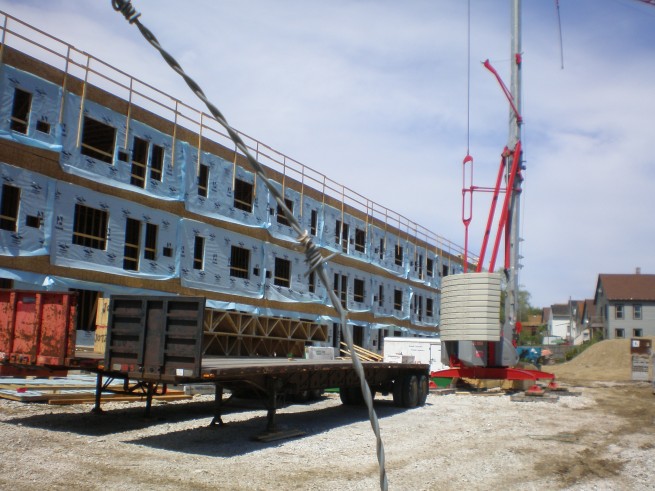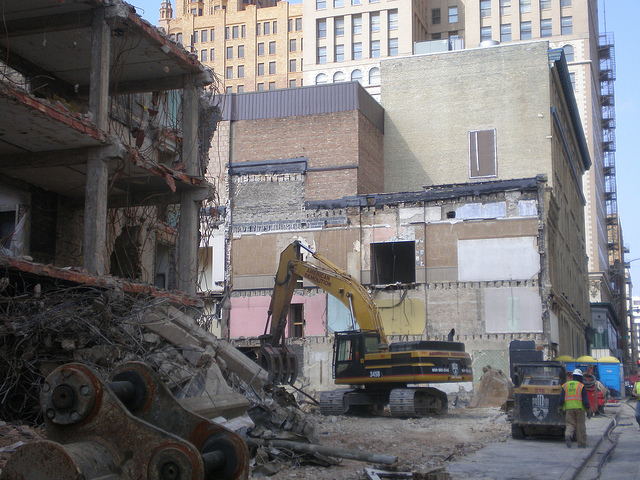Are Milwaukee’s Historic Preservation Laws Too Strong or Too Weak? Yes
Are Milwaukee’s historic preservation laws too strong or too weak? Should the entire ordinance be re-written, or is just a revision in order? Alderman Terry Witkowski‘s proposed overhaul to Milwaukee’s historic preservation ordinance sparked these very questions.
Preservation is an important component of Milwaukee’s built environment, but that doesn’t mean that adjustments to our preservation ordinance aren’t in order. Unlike Alderman Witkowski’s proposed changes, my suggestions are about freeing the process from politics, reducing the ability of lobbying and money to impact Milwaukee’s history, and at the same time making the process a touch more developer friendly.
Two recent development projects, and the process they went through, have shed light on the what the real issues are with Milwaukee’s historic preservation legislation.
One story is about a workforce housing development, and the effort to stop it from being built. General Capital Group planned to demolish a portion of the Hide House warehouse structures to develop an apartment building that was funded in part with WHEDA tax credit financing. Shortly before demolition was to begin, in what was a transparent effort to stop the project, Alderman Tony Zielinski nominated the building for historic designation. Opposition to the project stemmed from the proposed development being built with WHEDA tax credits, not because it might be historic. This abuse of our historic preservation ordinance did damage to the process, by making it about low-income residents and not historic preservation. This isn’t the only time this distortion of motivation has entered the debate, and this case might have encouraged others to follow this example by ‘putting a wrench‘ into another project. The wrench being our historic preservation laws being used for all the wrong reasons.
The second story, involved the construction the new Marriott Hotel in downtown Milwaukee. The proposal required the demolition of numerous buildings in the long established Historic East Side Commercial District. This proposal immediately became political, as a public relations firm was hired, a scapegoat was found in Alderman Bob Bauman, and an enemy was selected, historic preservation. It quickly became about Milwaukee being open for business, instead respecting the process and our history. Despite the perception of this process taking a long time, it took a total of 77 days to go from a partially filled file to Common Council approval, which was significantly quicker and faster than any project in recent historic. Not only did the commission move quickly, but in the end the development was able to move forward, despite this being a clear case of demolition by neglect. Unfortunately, for our history and our process, it became a political process that distorted our laws, disregarded procedure, and vilified preservation.
In both cases the developments ended up moving forward, but more importantly each case shows an example of how the process has been tainted by politics. In the first it was to stop ‘low-income’ housing. In the second the motivation behind opposition to a project was to protect a historic district (not just the individual buildings), but was twisted into a belief that the ordinance was anti-business.
Clearly, our historic preservation laws should balance development and preservation. But more importantly it should act to remove politics from preservation cases, not deepen its influence.
So lets critique Ald. Witkowski’s proposed legislation (note his legislation was loosely defined, and the final language has not been presented), and then I’ll make some of my own suggestions.
- Establishes a $25 fee to nominate a structure or district. There have only been a eleven properties nominated in the past five years, and a $25 would not have stopped any of these properties from being nominated.
- Restricts the nomination of a property or district to the property owner, a Common Council member, or by petition from at least 25 city residents. During the Historic Preservation Commission meeting on this ordinance Randy Bryant, HPC Chair, stated that this, “is really not a problem for us”, because the vast majority of the commission’s actions have been upheld by the Common Council. Although it is true that most of the commission’s actions have been upheld some refinement is still needed, because it isn’t simply that their actions are upheld it is also about protecting the process. The recommend change makes designation slightly more difficult while still allowing influence to enter the debate. Instead the ordinance should to allow the property owner, or 25 city residents to nominate a property, but remove the Common Council member’s ability to nominate a property. This will limit the political nature of the process, and although it raises the bar for designation, Milwaukee has two active preservation organizations that should be able to find 25 citizens willing to participate if the nomination is worthwhile.
- Demolition by Neglect. Speaking at the commission meeting Alderman Bauman said it right, “to the extent that this can be toughened up, I’m all in favor of it”. As the Marriott case pointed out, this is an area that needs improvement, as today it is common to wait for buildings to deteriorate to the point that demolition becomes the acceptable option. Perhaps the city could enact new grant or loan programs to help restore historic properties, while at same time the city should work to ensure better and stiffer enforcement of code violations so that buildings don’t fall into disrepair.
- Removes the provision requiring the HPC to wait 30 days for a further public hearing after a CoA application has been initially heard by the HPC. The large turnout and extensive development team’s appearance at the first commission meeting regarding the Marriott proposal made it abundantly clear that almost no one on either side of the issue was aware of this 30 day waiting period. Remove it or leave it as part of the process, but either way the key here is to clarify the language in the ordinance so that everyone, the commission members, the developer, and the public are keenly aware of the process so as to avoid any appearance of arcane tactics and political maneuvers being utilized.
- Voice of the Owner 1 – Requires that the commission attempts to obtain a written statement of the owner’s preference in the designation of a historic property. This would simply be the codifying of current policy, and therefore is a reasonable change.
- Voice of the Owner 2 – If the owner of a site or structure, or 35% or more of the owners included in a proposed district, file written objections, the designation would not become effective without super majorities (2/3) of both the Historic Preservation Commission and Common Council. Alderman Bauman put the impact of this change well saying, “this waters down the entire thrust of historic preservation”. The designation process does need improvement, (addressed in a bullet point below), but this would set a tremendously high bar for designation. At a minimum the super majorities should be dropped to simple majorities, and the property ownership required to stop designation should be at least a majority. Without these changes this ordinance might very well might become what Alderman Bauman called it, “the absentee landlord empowerment bill”.
- New construction design review – Requires the HPC to consider the Department of City Development’s design review recommendations when considering applications for certificates of appropriates for new construction. Having DCD involved in the discussion of new construction could lead to better projects, and in no way negatively impacts the saving of historic structures.
- Timing of Demolition Permits – Reduces the deferral period from 12 to 8 months. This might be an “olive branch to the development committee” as Jim O stated, and it seems reasonable, besides once it’s gone, it’s gone what difference does it make if it takes a year or 8 months.
- Proof of Financing for Issuance of Demolition Permit. One of the primary concerns with the Marriott proposal was that the historic buildings would be demolished, and nothing would be built in their place, an all too common occurrence. Avoiding this bait and switch, is a critical improvement that needs to be spelled out in detail in the ordinance.
- Consideration of Economic Hardship – Directs the HPC to develop a procedure to permit CoA applicants to make a case for economic hardship. Opening up the commission to consider economic hardship cuts away at the fundamental purpose of the commission, this should be handled through an appeal process through the Common Council.
- Legislative Oversight. Allows the Common Council, by resolution, to consider and act on any application for a CoA that has been on file for more than 90 days. No. This would move place historic preservation policy firmly into the political realm, and as Alderman Bauman explained could become “a new roadmap to applications, who don’t want to respect the system”.
- De-Listing 1 – a 3/4 (12 votes) vote of the Common Council (and commission) is require to terminate a historic designation (owner, common council member, 35%). Matt Jarosz, a commission member, summed up the fundamental issue with this change saying, “a minority of a neighborhood being able to change the character of a neighborhood is just a terrifying thing”. Clearly,the minimum requirements of 35% of a district being able to push de-listing of a historic neighborhood should at least be changed to a majority of property owners. Further, an individual Common Council member shouldn’t be able to bring a de-listing forward as that circumvents the other protections.
- Historic Plaque Program. Although, memorializing the failure to save our history seems sad its result is irrelevant to actual preservation, and therefore is an acceptable change to the ordinance.
Our additional suggestions.
- Tighten criteria for designation. To the public it appears that just about any old building can receive designation. The current criteria should be further clarified, and potentially narrowed to eliminate this perception.
- A Common Council member should not sit on the Historic Preservation Commission. The Common Council already has the ability to weigh in on a CoA, or a nomination through the appeals process, by having a Council member on the commission it opens this portion of the process to the appearance and potentially influence of politics. Additionally, it amounts to one vote being predetermined at the council level.
- A Common Council member should not be allowed to vote on any nomination they submitted to the Commission. If the ability for an Common Council member to nominate a property is not removed, as suggested above, then at a minimum the council member should not vote on the matter, as this also amounts to one vote being predetermined at the council level.
“Hopefully we can improve the ordinance”. I couldn’t agree more Alderman Witkowski.
Political Contributions Tracker
Displaying political contributions between people mentioned in this story. Learn more.
- November 19, 2015 - Robert Bauman received $50 from Terry Witkowski
























I think we need to look at broadening our view of what deserves preservation. Currently were losing a mid-century gem, The East Library, and we’re going to lose one of the best examples of mid-century modernism in the entire state.
The UWM union.
The UWM union is not being torn down.. simply renovated.
Huh, in all the years I’ve used the east library, I’ve never thought or heard anyone refer to it as a gem. Old doesn’t mean historic.
I am a homeowner in Brewer’s Hill. I have lived here my whole life and 15 years ago we bought a house and renovated it. Now I understand the city’s position on trying to preserve the “historic district” however, as a homeowner I feel that many times we are hung out to dry. Perfect example of this, we are held to a higher standard for ALL things regarding the property, including, Landscaping, Fences, Driveways, Garages, overall appearance of the home. We are NOT allowed to make any of the above listed changes without approval from the HPC. The problem I have with this is the head of the HPC is Paul Jakobivich, he has been kind enough to write a book on what HE considers the correct standards for all Historical Neighborhoods. Trust me when I say, if you fight him, you WILL LOSE and not just the ruling… they are really good at sicking the Department of Neighborhood Services on you. For example, I fought, I lost and shortly after that.. I had 10 fines or notices of fines from the department of Neighborhoos Services. I had to call my Alderwoman to put a stop to the constant harassment. Something simple like a fence… Oh this is a great one. I own a dog that requires a fence that he cannot “jump” over, however, in Brewer’s Hill your fence is limited to 4 feet and must be Cedar. Issue: at 4 feet my 3 year old can jump it. With Cedar- my dog LOVES to eat it. Another GREAT example, he would like to see Windows, without Bars on our garages… Did I miss the point that he was trying to make? I might as well go buy a NEON sign that says Enter here. WHY IN THE WORLD WOULD I PUT WINDOWS ON MY GARAGE? his answer: it looks better. Oh and the gutters must be COPPER – did he miss the bus on this one? Our neighbors down the alley complied with this, the morning after the were installed not only were the gutters gone, but so were the copper outdoor light fixtures he made them install.
The whole HPC is run by a SINGLE man, his views are the only ones that count and you- the homeowner are left standing holding the cost.
I think I have proved my point with this issue.. the HPC needs to be disbanded and we the homeowners that works so hard to create homes for our families should be granted the same liberties that people living a block away (in Brewers Hill, but not HISTORIC) are granted.